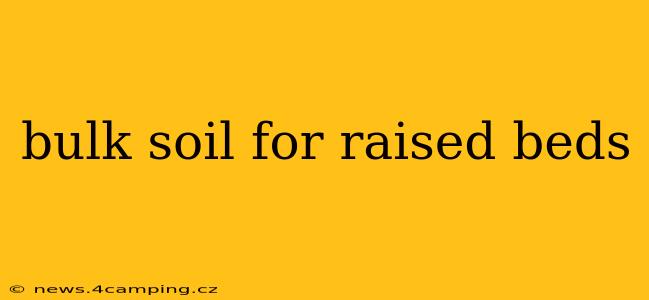Building raised garden beds offers numerous advantages, from improved drainage to easier access for gardening enthusiasts. However, selecting the right soil is crucial for thriving plants. This comprehensive guide explores the nuances of choosing bulk soil for your raised beds, ensuring your plants flourish. We'll cover everything from understanding soil composition to sourcing the best bulk options for your gardening needs.
What Type of Soil is Best for Raised Garden Beds?
The ideal soil for raised beds is a well-draining, nutrient-rich mix that retains moisture without becoming waterlogged. Avoid using just plain topsoil, as it often compacts over time, restricting root growth and oxygen flow. A good blend typically includes a combination of:
- Compost: Adds crucial organic matter, improving soil structure, water retention, and nutrient availability.
- Topsoil: Provides a base layer rich in minerals and nutrients. Ensure it's free of weeds and debris.
- Sand or Perlite: Improves drainage and aeration, particularly vital for raised beds prone to waterlogging.
- Peat Moss (optional): Enhances water retention and provides acidity for acid-loving plants. Note: Consider sustainable alternatives like coco coir.
How Much Soil Do I Need for My Raised Garden Beds?
Calculating the required amount of soil depends on the dimensions of your raised beds. Here's a simple formula:
Volume = Length x Width x Height
Remember to convert your measurements to cubic feet or cubic yards, depending on how your supplier sells the bulk soil. Most suppliers sell in cubic yards, which is a significant volume. It's always better to overestimate slightly than to run short mid-project.
What are the Different Types of Bulk Soil Available?
Several types of bulk soil cater to different gardening needs:
- Garden Soil Mix: A pre-mixed blend containing topsoil, compost, and sometimes other amendments. A convenient option for beginners.
- Topsoil Alone: A more economical choice, but often requires amending with compost and other materials to improve its drainage and nutrient content.
- Custom Soil Blends: Some suppliers offer custom blends tailored to specific plant needs or soil conditions. This is a great option for specialized gardens.
Where Can I Buy Bulk Soil for Raised Beds?
Sourcing bulk soil typically involves these options:
- Local Landscape Supply Companies: Often offer competitive pricing and delivery services for larger quantities.
- Nurseries and Garden Centers: May offer smaller bulk options or pre-mixed blends ideal for raised beds.
- Soil Delivery Services: Convenient for larger projects, often offering a wider range of soil types and mixes.
How Much Does Bulk Soil Cost?
The cost of bulk soil varies considerably depending on location, supplier, soil type, and delivery. Prices are usually quoted per cubic yard. Contact your local suppliers for accurate pricing. Remember that the upfront cost of quality soil is an investment that pays dividends in healthier plants and a more productive garden.
What are the Benefits of Using Bulk Soil in Raised Beds?
Using bulk soil provides significant advantages over smaller bags of soil:
- Cost-effectiveness: Purchasing in bulk typically reduces the cost per cubic foot.
- Convenience: Delivery services save you the hassle of transporting numerous bags.
- Improved Soil Quality: Allows you to create a well-balanced, customized soil mix for optimal plant growth.
What if My Raised Bed Soil Compacts Over Time?
Soil compaction is a common problem in raised beds. To prevent or address this:
- Use a well-draining mix: Incorporate enough sand or perlite to ensure proper aeration.
- Add compost annually: Regular compost additions improve soil structure and prevent compaction.
- Avoid overwatering: Excessive watering can lead to compaction. Water deeply but less frequently.
- Aerate the soil periodically: Use a garden fork to loosen compacted areas.
Can I Use Regular Topsoil for Raised Garden Beds?
While you can use regular topsoil, it's often not ideal. Topsoil alone might compact easily, leading to poor drainage and restricted root growth. Amending topsoil with compost, sand, and other components is highly recommended to create a more suitable mix for raised beds.
This comprehensive guide provides a solid foundation for selecting the right bulk soil for your raised beds. Remember to carefully consider your plant needs, budget, and available resources when making your choice. Happy gardening!
